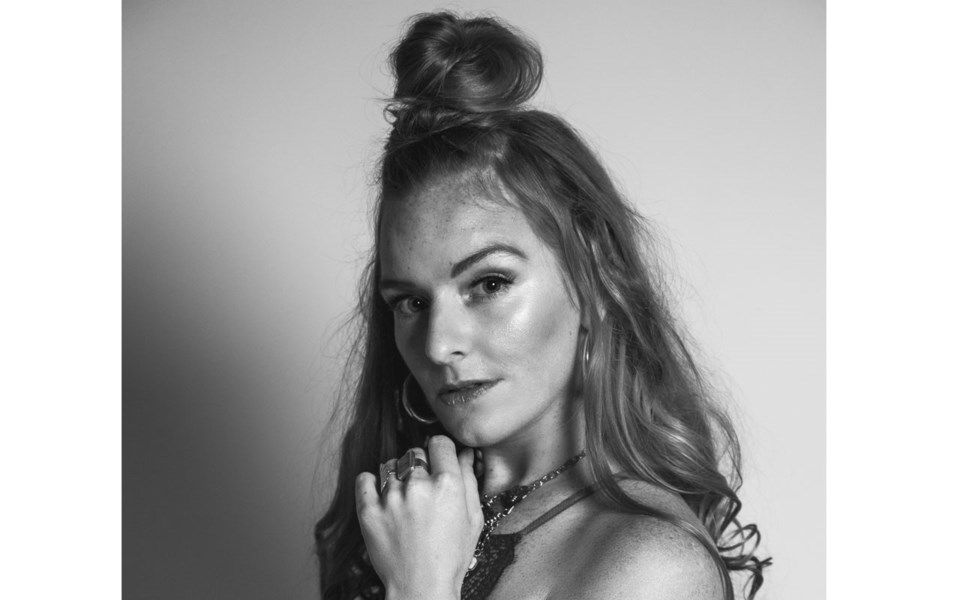Hip-hop, generally speaking, has never been all that interested in spiritual matters. Many a rapper has evoked God in their verses, sure—hell, Kanye’s whole son-of-God shtick has basically defined the second half of his career, if you forget the whole MAGA hat thing—but it’s usually in the form of a ridiculous brag (also Kanye: “I am a God/hurry up with the damn massage”) or a reckoning with some unspeakable deed (Prodigy: “Lord forgive me, the Hennessy got me not knowin’ how to act”).
So yeah, rap has always been concerned with the soul, the thin line between good and evil, the inevitable tug of temptation into sin. But faith? Spiritual practice? Self-discipline? The quiet work of inner exploration? That’s a bit harder to find.
This historical dividing line, rap’s own separation of church and state, might help explain why Sea-to-Sky hip-hop artist Lozen had been so reluctant to merge two parts of her life that now seem so naturally intertwined.
“I’m recognizing that music is a part of my spiritual practice and that everything I do can be, in a sense, an act of devotion on my soul path,” she says.
“Previous to Goal Digger, I kept my physical life and spiritual life very compartmentalized. I’ve come to realize that integrating the two is essential for my growth not only as a creative but as a human being in general.”
Born Meaghan Mullaly, Lozen’s introduction to spirituality came from her father, a “modern Buddhist” who exposed her to the ideas of Eastern philosophy. Since then, she has continued her own spiritual practice, and ultimately, fused it with her creative practice.
In fact, each of the seven tracks on Goal Digger, released by Soul Path Records Nov. 27, corresponds with a different chakra, and the album artwork, which Lozen designed herself, was inspired by a Tibetan singing bowl a friend had given to her.
She’s hopeful the album, and by extension her own personal journey, can maybe serve as something of a roadmap towards a meaningful life.
“When I talk about Goal Digger, it’s [about] digging deeper on the superficial goals,” she says. “I had come to a place where I had set these goals for myself, and a lot of them I had achieved, but then I had to dig deeper and ask if it was what I really wanted. I had to check in. A big part of it was realizing I was out of balance because I wasn’t nourishing the parts of myself that really needed nourishing.”
A former battle rapper and Whistler FM radio host who left the resort’s party scene for the relative peace of Squamish, Lozen had to learn the hard way that burning the candle at both ends wasn’t productive for her music career or her personal life.
Bouncing from gig to gig, reluctant to turn down any opportunity, she realized “I wasn’t honouring my body, essentially,” she recalls. “I was constantly losing my voice, getting vocal nodules and having to get surgeries and stuff like that. So I thought, ‘How do I not only sustain what I do but have that in balance with the rest of my life?”
The pandemic has offered a welcome opportunity to slow down, and like any hard-working artist on their grind, Lozen adapted to the new reality by continuing to break down barriers between her music and the rest of her pursuits, like dance.
“I’d never really thought about integrating it into my music before, and I don’t know why I separated them in the past,” she relays. “It was brought up to me several times at shows, because I would do my set, usually a hip-hop or electronic set, but then after I’d be wilding out and dancing and breaking.”
Just as comfortable spitting 16-bar verses as she is belting out Janis Joplin, Lozen switched up her process this time around, writing songs on her acoustic before penning a verse.
“I wanted to be more involved in the production process and I understood I needed [a producer] to do that with who had some kind of chord theory,” she explains.
“I wasn’t actually doing it, but just having that language has helped me be more involved in the composition.” (Veteran beat-maker Vago, who has worked with other notable Canadian hip-hop artists like Swollen Members, Choclair and Kardinal Offishall, handled production on the record.)
Lozen has even become her own merchandiser of late, after a vendor bumped the rates to produce a line of hats she wanted to go with her standout single and music video, “Ladies World” (which spoofs on the seminal ‘90s flick, Wayne’s World). Instead of eating the unexpected cost, she picked up a vintage sewing machine and stitched the hats herself.
“I asked myself how I could use this as an opportunity. I had been wanting to shift my creativity. Music is a part of my creativity, but I love creating in different mediums as well,” she says. “So here was a way for me … to be a part of that process. I get to use my hands and get out of my brain and get more physical. I enjoyed that.”
For more info and to hear the record, visit lozenmusic.com.




